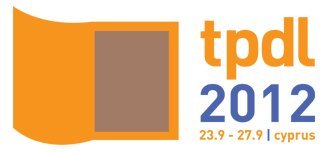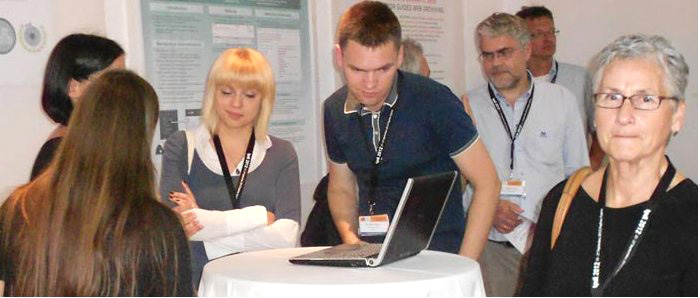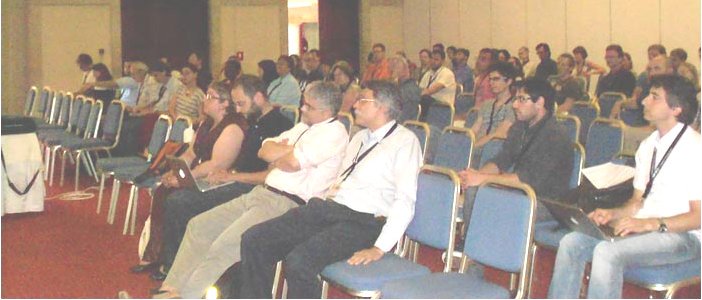International Conference on Theory and Practice of Digital Libraries (TPDL) 2012
Anna Mastora and Sarantos Kapidakis report on TPDL 2012 held at Paphos, Cyprus, over 23-27 September 2012.
The 16th International Conference on Theory and Practice of Digital Libraries (TPDL) 2012 [1] was another successful event in the series of ECDL/TPDL conferences which has been the leading European scientific forum on digital libraries for 15 years. Across these years, the conference has brought together researchers, developers, content providers and users in the field of digital libraries by addressing issues in the area where theoretical and applied research meet, such as digital library models, architectures, functionality, users, and quality.

After being held in 11 different countries, the conference moved to the beautiful island of Cyprus. The conference was organised by the Cyprus University of Technology in collaboration with the University of Cyprus and the City University London and took place at Paphos during 23-27 September 2012.
Conference Overview and Some Statistics
The Conference Committee consisted of Panayiotis Zaphiris from the Cyprus University of Technology as General Chair, George Buchanan from the City University and Edie Rasmussen from the University of British Columbia as Programme Chairs, and Fernando Loizides from the Cyprus University of Technology as Organising Chair [2]. Each year the conference committee selects a general theme of special interest; for this edition it was Cultural Heritage and the means of addressing the challenge of combining our digital futures with the digital past. This is why the aim of the conference was to attract contributions in four major areas, namely Applications and User Experience, Supporting Discovery, Digital Humanities, and Research Data.

Posters and demos session TPDL 2012 (Source.)
The conference was sponsored by Microsoft Research, the Coalition for Networked Information (CNI), Austrian Airlines, the Cyprus Tourism Organisation and Facet Publishing. The proceedings were published by Springer Verlag in LNCS 7489 (2012) [3].
Keynote Speakers
Following the tradition of past years, the TPDL 2012 conference brought together important figures from the field of digital libraries worldwide. The keynote speakers’ presentations made a significant contribution to the success of this conference. The first to open the main conference was delivered by Mounia Lalmas from Yahoo! Research Barcelona who addressed User engagement in the digital world referring to the quality of the user experience that emphasises the positive aspects of the interaction with digital technology and, in particular, the phenomena associated with wanting to use that technology longer and more frequently. The second keynote was by Andreas Lanitis from the Cyprus University of Technology who talked On the Preservation of Cultural Heritage Through Digitization, Restoration, Reproduction and Usage, focusing on research work related to the digital preservation of Cypriot Cultural Heritage artefacts. Cathy Marshall from Microsoft Research gave the third, outstanding, keynote entitled Whose content is it anyway? Social media, personal data, and the fate of our digital legacy. Cathy looked into the challenges of personal digital archiving - challenges that arise from the nature of digital material, existing practices, the rise of social media and the complexities of ownership - and the implications they held for libraries and other memory institutions.
Main Conference
Doctoral Consortium
The conference began – as is customary in recent years - with the Doctoral Consortium Session on Sunday 23 September. Since this kind of session is by tradition closed to the public, we will take the word from the participants that it proved to be a worthwhile experience. PhD students had the opportunity to receive helpful comments and guidance both from their peers and the mentors. Interdisciplinary domains such as digital libraries are attracting researchers from different schools of thought, and such exchanges, particularly for researchers in the early stages of their career, are beginning to play a significant role in amalgamating research cultures and enriching individual perspectives on research questions and approaches.
Monday 24 September
On Monday 24 September, the main conference began with an enthusiastic keynote by Mounia Lalmas. A great opening for the conference since Mounia talked persuasively about the role of the user, who is sometimes overlooked within the research domain of Information Retrieval. Yet the user is a multi-faceted actor, and consequently research about the user has to bring together perspectives on different research domains, such as techniques from Web analytics and information science, multimodal human computer interaction as well as cognitive psychology. Mounia’s presentation put the User in the centre of research in order to measure user engagement with digital technology.
Two parallel sessions took place before lunch, namely “Linked Data” and “Analysing and Enriching Documents”, followed by “Folksonomy and Ontology” and “Extracting and Indexing”. The “Minute Madness” took place after the coffee break during which all participants with accepted posters and demos had to present to the delegates their work within a minute (no doubt about where the “madness” comes from!) and make it interesting and attractive for others to pay a visit to their stands.

The shoreline at sunset on the Akamas Peninsula, Cyprus (Source.)
The Poster/Demo session was clearly a hit since there was much lively discussion, either in smaller or larger groups of participants in a well-filled room, and contact details were exchanged when common research grounds were identified. Best Demo award was given to Tanja Mer?un, Maja Žumer and Trond Aalberg for their “FrbrVis: An information visualisation approach to presenting FRBR work families”. Discussions looked like over-running the scheduled session, but fortunately the welcome reception, scheduled to follow it, was being held in the same area, so the discussions had only to adjourn next door.
Tuesday 25 September
On Tuesday 25 September the conference opened to the second keynote speaker, Andreas Lanitis, an associate professor at the Department of Multimedia and Graphic Arts of Cyprus University of Technology. He presented several current projects being implemented in Cyprus, all in the area of better presentation of its rich and diverse cultural heritage – from knowledge on wine production to 3D reconstruction of historical buildings. In his inspirational talk he explained that while currently various types of heritage were ‘segmented’, the wealth of experience across the projects surely meant that in the future we would see more holistic solutions. Besides the interesting insights into the methods applied to particular types of objects, Andreas’ presentation also had the nice touch of immersing the audience in the spirit of the Cypriot cultural heritage.
A further two parallel sessions were held before the lunch break: one focused on “Mobiles and Place” and the other on “Content and Metadata Quality” – an excellent illustration also of the range of issues generated by the major conference theme of cultural heritage. After lunch, the conference continued with two further topics: “Preservation” and “Organising Collections”. Following the coffee break, there was a further session about “Information Retrieval”. At the same time, a very interesting panel discussion was taking place about “Evaluating Digital Libraries: Methodologies and Challenges”. The panel was formed by Anne Adams (Open University, UK), Jose Borbinha (IST, Portugal), Mick Khoo (Drexel University, USA) and Mounia Lalmas (Yahoo Research, Spain) presented their personal perspectives on evaluation which provided a good mix of information retrieval considerations, user-centred observations and software engineering hints. The audience was particularly engaged with the topic which was to reappear later during the conference workshops. One impression from the discussion was that while there were evaluation models specifically coined or refined within the digital library community, they were neither widely known nor applied [4].
Wednesday 26 September
The last day of the main conference, Wednesday 26 September, Cathy Marshall opened the day’s work with the third keynote speech keeping the audience on its toes. Cathy delivered an interesting, sharp and well-prepared presentation and saved the day! The last parallel sessions of the conference addressed the topics of “Heritage and Sustainability” and “User Behaviour”. During the latter session, Michael Khoo presented the paper (co-authored with Catherine Hall) “What Would ‘Google’ Do? Users’ Mental Models of a Digital Library Search Engine” which was awarded the Best Paper award. Additionally, the paper “Identifying References to Datasets in Publications” by Dominique Ritze, Katarina Boland, Brigitte Mathiak and Kai Eckert was assigned the Best Student Paper award.
Workshops
The final day of the event, Thursday 27 September, three workshops took place in parallel. Following a successful tradition starting dating from 2000, the 11th European Networked Knowledge Organisation Systems (NKOS) Workshop was held during this year’s TPDL. A large part of the workshop was dedicated to the ISO-25964 Thesaurus Standard, as well as SKOS-related issues.
The 2nd International Workshop on Semantic Digital Archives (SDA) also took place on 27 September addressing the issues of digital preservation, recommender systems, semantic technologies and ontologies, along with challenges and opportunities for digital archives.
Finally, the International Workshop on Supporting Users' Exploration of Digital Libraries (SUEDL) took place for the first time. The aim of the workshop was to stimulate collaboration among experts and stakeholders in digital libraries, cultural heritage, natural language processing and information retrieval, in order to explore methods and strategies to support exploration of digital libraries, beyond the white box paradigm of search and click. Among the highlights of this workshop were the keynote speech by David Haskiya (Europeana) entitled Browsing Europeana - Opportunities and Challenges and the very lively discussion that was stimulated by the panel. While this event was not part of a series, there was a common feeling that it should be held again in the future.
Social Events
It is not only the time attending the conference sessions that matters. Interesting discussions take place during the social events organised as part of the conference. The welcome reception on the lovely terrace of the conference venue was an opportunity both to discuss further the poster and demo presentations, and catch up with old friends and acquaintances from the community and find out what they were currently up to.
Exploiting Social Media
The conference enjoyed an active presence in the social media, like Facebook and Twitter, which served to support the dissemination of up-to-date information. [5]
TPDL 2013
Save the date for the next TPDL conference [6] which bears the general theme Sharing meaningful information and will take place in Valetta, Malta over 22-26 September 2013. General Chairs of the event have been appointed: Milena Dobreva from the University of Malta (Malta) and Giannis Tsakonas from the University of Patras (Greece). The Programme Chairs of TPDL 2013 will be Trond Aalberg from the Norwegian University of Technology and Science (Norway) and Christos Papatheodorou from the Ionian University (Greece). Given their experience gleaned from organising past events, we can be confident that next year’s TPDL will be an opportunity not to miss. In the photo below, the TPDL 2013 Chairs share the front row during the closing ceremony of this year’s conference.

Front row, the Chairs of TPDL 2013:
Milena Dobreva, Giannis Tsakonas, Trond Aalberg and Christos Papatheodorou
(Source.)
Conclusion: The Big Digital Library Picture
The selection of a topic for each conference reflects the general ideas and topics that are currently attracting – or requiring – more research in the overall community. The cultural heritage domain is one of the areas to have been addressed very early on in digital library projects, and subsequently, in research outcomes. What makes it so attractive to the digital library community and what is the value that this type of research brings to the larger digital library domain?
In the wake of the 2012 conference, one can come up with a wide range of answers to the questions above. Admittedly, there are still unresolved issues about how best to present and access cultural heritage in digital form. But beyond the complexity and variety of the artefacts (which are also expanding in the direction of the documentation of intangible cultural heritage), this domain now has to resolve the issues of increased scale, interoperability, better resource discovery – all matters of significance within ‘core’ digital library research. It was amazing, for example, to realise how many different user-related issues also need to be tackled – ranging from use of different scripts and orthographic variation, to the need to offer users of vast cultural collections more intuitive content-based retrieval instruments. Moreover, to make things even more complicated, while listening to the keynote speeches in particular, one could appreciate more clearly that although our community tries to resolve problems identified some time ago, new ones arise to demand our attention. The fact is that in order to gain a proper understanding of how people use digital libraries we should not be thinking in terms of obtaining a ‘snapshot’, but, instead, of seeking to understand a process subject to constant evolution. To this end and in a variety of ways , the topics discussed at TPDL 2012 contributed to the expansion of knowledge on digital libraries [7].

If one looks at the recently edited collection of research perspectives on digital libraries edited by G. Chowdhury and S. Foo [8], particular domains such as cultural heritage – as in the case of TPDL 2012 - are not discussed from the standpoint of which challenges need to be addressed. This actually highlights the importance of selecting the theme for a conference – because it allows us to see how well the topics emerging from the domain – and from real life – compare with the current state of the art in digital libraries.
References
- The 16th International Conference on Theory and Practice of Digital Libraries (TPDL) 2012 http://www.tpdl2012.org/
- Equally important roles were held by other community members such as Maria Poveda (Publicity Chair), Trond Aalberg (Demo Chair), Fabrizio Sebastiani (Workshop Chair), Rudi Schmeide and Andri Ioannou (Panels Chairs), Christos Papatheodorou (Tutorials Chair), as well as Stefan Gradmann and Birger Larsen (Doctoral Consortium Chairs).
- For online access, please visit Springer Verlag, LNCS 7489 (2012)
http://link.springer.com/book/10.1007/978-3-642-33290-6/page/1. - Readers keen to find further information on this topic are directed to the edited collection Tsakonas, G., Papatheodorou, C. Evaluation of digital libraries: An insight into useful applications and methods. Chandos, 2009.
- Some readers might also be interested to follow blogs about the conference experience; in the time of writing we could identify two:
Blog of Research and Teaching Updates from the Web Science and Digital Libraries Research Group at Old Dominion University http://ws-dl.blogspot.com/2012/11/2012-11-06-tpdl-2012-conference.html and
Blog of the Pozna? Supercomputing and Networking Center (PSNC) Network Services Department http://dl.psnc.pl/2012/10/08/tpdl-2012-theory-and-practice-of-digital-libraries/ - TPDL 2013 http://www.tpdl2013.info/
- Research topics in digital libraries and their dynamics over time are themselves a subject of study, see for example the paper from ICADL 2011 of Son Hoang Nguyen and Gobinda Chowdhury. Digital Library Research (1990-2010): A Knowledge Map of Core Topics and Subtopics. (Lecture Notes in Computer Science, 2011, Volume 7008, Digital Libraries: For Cultural Heritage, Knowledge Dissemination, and Future Creation, pp. 367-371).
- Chowdhury, G.,and Foo, S. (Eds.) Digital Libraries and Information Access. Research perspectives. Facet, 2012.
Author Details
Email: mastora@ionio.gr
Web site: http://dlib.ionio.gr/
Anna Mastora is a PhD candidate (holding the Greece-EU co-financed “Heracleitus” scholarship) at the Department of Archives and Library Science, Ionian University. She holds a Library Science degree from the Technological Educational Institute in Athens (Greece) and an MSc in Information Management from the University of Strathclyde in Glasgow (UK). She has worked for the National Hellenic Research Foundation / National Documentation Centre as a metadata and software development librarian, while she has also taught student librarians information-searching techniques. Currently she works at the Secretariat General of Information and Communication – Secretariat General of Mass Media (Greece) as a collection and reference librarian. Her main research interests comprise digital libraries, search engines, information-searching techniques, user behaviour and language-processing techniques. As a member of the Laboratory on Digital Libraries and Electronic Publishing, she actively participated in the Organising Committee of the European Conference on Digital Libraries (ECDL) in 2009.
Email: sarantos@ionio.gr
Web site: http://dlib.ionio.gr/
Sarantos Kapidakis is Professor at the Department of Archives and Library Science, Ionian University, Corfu, Greece, and Director of the Laboratory on Digital Libraries and Electronic Publishing. He is also a member of the Steering Committee of the National Archives of Greece. In the past, he has been employed by the National Documentation Centre, Greece, MIT, USA, the University of Crete, and the Foundation for Research and Technology – Hellas. He received a Ph.D. in Computer Science from Princeton University in 1990. He also holds a MSc. from Princeton University and a Diploma in Electrical Engineering from the National Technical University of Athens. As part of his research on Digital Libraries, he participated in the DELOS Network of Excellence on Digital Libraries, and was the Chair of the European Conference on Digital Libraries (ECDL) in 2009.
